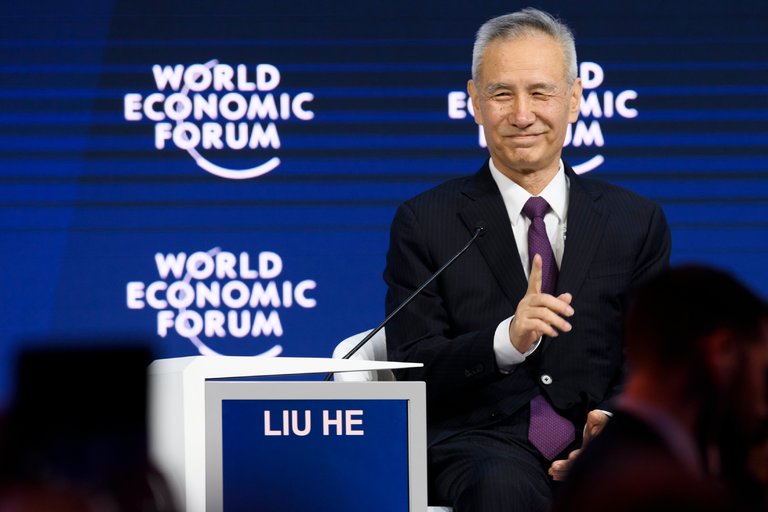
New York Times reports that President Trump used the World Economic Forum meeting to woo investors and business leaders by reassuring them that "America first does not mean America alone." But it was clear in Davos, Switzerland, this past week that geopolitical momentum lay with Beijing, not Washington. At one end of town, President Michel Temer of Brazil welcomed an unexpected offer from Beijing for Latin American nations to work closely with a Chinese initiative, known as the Belt and Road, intended to spread its economic and diplomatic influence abroad. At the other end of town, a senior Chinese diplomat helped introduce the prime minister of Pakistan at a breakfast meeting. Prime Minister Shahid Khaqan Abbasi used his talk to praise the rapidly expanding Chinese investments in his country, including to build power stations and a large port. One of the best-attended speeches at the forum was that of Liu He, a member of China's ruling Politburo, who promoted the Belt and Road initiative, also known as One Belt, One Road. Participants here said the Chinese initiative was already rivaling more established, traditionally American-led, international institutions. "The China One Belt, One Road is going to be the new W.T.O. — like it or not," said Joe Kaeser, chief executive of Siemens, the German industrial giant, referring to the World Trade Organization.
The BusinessInsider website reports that China and Russia are sending aircraft and naval vessels into Japanese territory, and the two countries show no sign of slowing down. China's aggressive activity in the South China Sea is well documented. It has disputes with five different countries over a number of islands and waters that they claim to control. Comparatively, the East China Sea — where this conflict with Japan has been unfolding — has been much more calm. At the center of China and Japan's feud is the Senkaku Islands, a group of uninhabited islands under Japanese control, but claimed by China who call them the Diaoyu Islands. Richard Weitz, a senior fellow and the director of the Center for Political-Military Analysis at the Hudson Institute, told Business Insider that the Chinese "want to enforce their claims" by forcing foreign planes to acknowledge China's capability to control airspace and the waters of contested territory. Weitz said Russia is more interested "in monitoring US military activity in the country." Its conflict with Japan also concerns the Kuril Islands, which were historically part of Japan and were taken by the Soviet Union in the last days of World War II. For now, there does not appear to be any coordination between China and Russia as they flex their muscles in the Pacific. That could change, Weitz warned, if the US interferes and drives the two powers closer together.
- 2018-01-26 'Globalism with Chinese characteristics' is on display in Davos. But it's not everything it seems
- 2018-01-25 U.S. imposes more North Korea sanctions; urges China, Russia expulsions
- 2018-01-24 What could China do in a US trade war?
- 2018-01-23 U.S. Tariffs, Aimed at China and South Korea, to Hit Targets Worldwide
- 2018-01-22 Trump’s moment of truth on China has arrived
- 2018-01-21 China's breathtaking transformation into a scientific superpower
- 2018-01-19 Trump's defense strategy sees China and Russia as biggest threats
- 2018-01-18 China's Economy Growth Look Strong. Maybe Too Strong.
- 2018-01-17 Ex-C.I.A. Officer Suspected of Compromising Chinese Informants Is Arrested
- 2018-01-16 China fake data mask economic rebound
- Reuters Trump security team sees building US 5G network as option
- The Washington Post Command and control: China's Communist Party extends reach into foreign companies
- Bloomberg China Ousted as Asia's No. 1 Buyer of US Commercial Property
- Bloomberg China Infrastructure Push Reaches Arctic, Further Isolating US
- Financial Times China faces refinancing crunch with $2.7tn of bonds bearing down
- www.independent.co.uk Extreme weather in China forces thousands of evacuations as heavy snow and ice cause chaos ...
- New York Times The Propaganda I See on My Morning Commute
- ca.reuters.com China declares intention to improve ties with Japan
- Financial Times Pakistan turns to Russia and China after US military aid freeze
- Reuters Beijing city to take clean fuel drive to another 450 villages
- Bloomberg China Sees Obstacles to Repairing Ties With Japan as Envoys Meet
- The Washington Post US calls for release of missing Chinese bookseller
- Reuters German minister urges fast passage of EU law on Chinese takeovers
- Reuters China fines 12 banks over illegal bill trading, fraud
